Thu 18 Mar 2021
A Murder Mystery Review by David Vineyard: LORD EDGWARE DIES (1934).
Posted by Steve under Mystery movies , Reviews[4] Comments
LORD EDGWARE DIES. RKO Radio Pictures, UK, 1934. Austin Trevor (Hercule Poirot), Jane Carr, Richard Cooper (Captain Hastings), John Turnbull (Inspector Japp), C. V. France Screenplay by H. Fowler Mear, based on the 1933 novel by Agatha Christie. Directed by Henry Edwards. Currently available on YouTube.
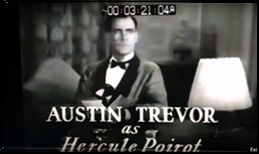
Why is everyone trying to frame Lady Edgware for murder, including herself, even before anyone dies?
At a charity ball Lady Edgware (Jane Carr), an American musical star who married into a peerage, tries to engage Hercule Poirot (Austin Trevor) and his friend Captain Hastings (Richard Cooper) to persuade her older husband Lord Edgware (C.V. France) to give her a divorce before she kills him. Not long after that a young actor friend of Lady Edgware from Hollywood goes to Poirot to beg him to help her before she kills her husband in desperation claiming she could do anything and does not understand right from wrong.
Ironically when Poirot and Hastings call on Lord Edgware he informs them he agreed to the divorce in a letter six months earlier, and letter his wife claims to have never received.
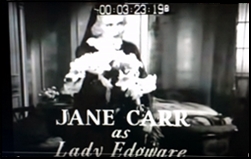
Then Lord Edgware is found murdered and Inspector Japp (John Turnbull) called in. Witnesses claim Lady Edgware appeared at the house, announced herself, entered the study, and murdered Lord Edgware, but then a quick investigation proves Lady Edgware was at a party, received a mysterious phone call, and could not have killed her husband.
Just what is going on? Poirot proves someone could have impersonated Lady Edgware easily, but the suspect, an entertainer who did an imitation of Lady Edgware at the charity ball is found dead by her servant the next morning.
There are suspects, Edgware’s daughter, a nephew Ronald Marsh who is something of a wastrel and needs the money and title he will inherit, a mysterious missing thirteenth guest at the party that provided Lady Edgware’s alibi, Lady Edgware’s servant who insisted she attend the party that provided her alibi, and any number of red herrings in the inimitable Christie style.
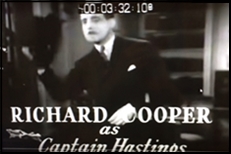
Austin Trevor, who plays Poirot here, played more detectives in more British films than just about any other actor. In addition to Poirot he was Anthony Gethryn in The Nursemaid Who Disappeared and any number of British and French policemen on screen (he’s the policeman who tries to help Jean Simmons in So Long At the Fair some twenty years after this — Trevor played almost as many foreign as British detectives). Despite that he makes for an odd Poirot, tall, relatively handsome, with a full head of hair, no mustaches, a more reserved manner, and little eccentricity. Luckily with Christie involved in the screenplay Poirot’s keen mind is on full display if his eccentricity is not.
As the case goes on it grows more complex. The Duke of Merton, a strongly religious man, who Lady Edgware wanted to marry it turns out would never marry her if she was divorced. He coolly dismisses Poirot and Hastings, but Poirot notes he is writing a love letter to her by reading it upside down on Merton’s desk.
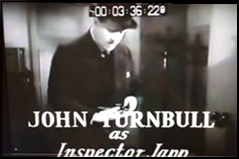
Carr plays Lady Edgware as a cross between Jean Harlow and Mae West, and quite effectively so there is more than some suspicion she could easily have murdered her husband, and might easily be as amoral as claimed, meanwhile that mysterious thirteenth guest features more importantly in the plot.
Clues include a gold box holding sleeping powders, convex pence nez, and the torn page of a letter mailed by one victim to her sister in America.
“No, not yet, he would but say it was another nest of the mare.â€
Another victim is murdered while on the phone to Poirot about to reveal the murderer.
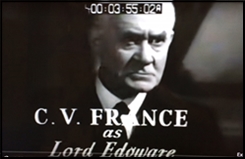
The solution is cleverly planned if hastily delivered.
Hastings: “And I’m hanged if we can have that.â€
The Killer: “Under the circumstances that’s a very tactless remark.â€
Nothing great here, but it is much better than reviews I’ve read and it moves interestingly at a clip. The mystery is fairly well done considering the limitations of the form, and Trevor and Carr overcome any drawbacks in the rest of the cast with energy and professionalism. If noting else it is worth seeing strictly from a historical point of view.
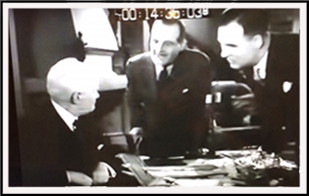
March 19th, 2021 at 12:43 pm
Here’s the YouTube link:
https://www.youtube.com/watch?v=5MPZbhpdxPU
I hadn’t known about this film before, but it’s now in my queue to be watched.
According to the person who uploaded it, “This 1934 version of Lord Edgware Dies is the earliest known surviving screen portrayal of Agatha Christie’s Poirot. It stars Austin Trevor as the detective, his third time in the role – the previous two films are thought to be lost.”
March 19th, 2021 at 12:50 pm
And here’s a list of Austin Trevor’s film appearances. It does not include roles he played on mostly British television. On Wikipedia he is quoted as saying that he got the part of Hercule Poirot only because he could speak French. Also note his final appearance:
Filmography
The W Plan (1930) – Captain of Military Police
At the Villa Rose (1930) – Hanaud
Escape (1930) – Parson
The Man from Chicago (1930) – Inspector Drew
Alibi (1931) – Hercule Poirot
A Night in Montmartre (1931) – Paul deLisle
Black Coffee (1931) – Hercule Poirot
The Crooked Lady (1932) – Captain James Kent
The Chinese Puzzle (1932) – Paul Markatel
A Safe Proposition (1932) – Count Tonelli
On Secret Service (1933) – Captain Larco
The Broken Melody (1934) – Pierre Falaise
Lord Edgware Dies (1934) – Hercule Poirot
Death at Broadcasting House (1934) – Leopold Dryden
Inside the Room (1935) – Pierre Santos
Mimi (1935) – Lamotte
Royal Cavalcade (1935) – Capt. Oates
The Silent Passenger (1935) – Inspector Parker
Parisian Life (1936) – Don Joao
La Vie parisienne (1936) РDon Jo̢o (uncredited)
The Beloved Vagabond (1936) – Count de Verneuil
As You Like It (1936) – Le Beau
Dusty Ermine (1936) – Swiss Hotelier-Gang Leader
Rembrandt (1936) – Marquis
Sabotage (1936) – Vladimir – Paymaster at Aquarium (uncredited)
Knight Without Armour (1937) – Dr. Muller
Dark Journey (1937) – Col. Adraxine
Goodbye, Mr. Chips (1939) – Ralston
The Followers (1939, television film of the play by Harold Brighouse) – Colonel Redfern
The Lion Has Wings (1939) – Schulemburg – German Air Chief of Staff
Law and Disorder (1940) – Heinreks
Night Train to Munich (1940) – Capt. Prada
Under Your Hat (1940) – Boris Vladimir
The Briggs Family (1940) – John Smith
The Seventh Survivor (1942) – Captain Hartzmann
The Big Blockade (1942) – German: U-boat Captain
The Young Mr. Pitt (1942) – French Registrar (uncredited)
The New Lot (1943) – Soldier Talking to Corporal (uncredited)
Heaven Is Round the Corner (1944) – John Cardew
Champagne Charlie (1944) – The Duke
Lisbon Story (1946) – Maj. Lutzen
Anna Karenina (1948) – Col. Vronsky
The Red Shoes (1948) – Prof. Palmer
So Long at the Fair (1950) – Police Commissaire
Father Brown (1954) – Herald
To Paris with Love (1955) – Leon de Colville
Tons of Trouble (1956) – Sir Hervey Shaw
Seven Waves Away (1957) – Edward Wilton
Dangerous Exile (1957) – M. Petitval
The Naked Truth (1957) – Minister with Heart Attack (uncredited)
Carlton-Browne of the F.O. (1959) – Secretary General (uncredited)
Horrors of the Black Museum (1959) – Commissioner Wayne
Konga (1961) – Dean Foster
The Day the Earth Caught Fire (1961) – Sir John Kelly
The Court Martial of Major Keller (1961) – Power
Never Back Losers (1961) – Col. Warburton
The Alphabet Murders (1965) – Judson
March 19th, 2021 at 9:17 pm
David, I have read your commentaries for more than ten years, on and off, as I occasionally check into this site. Do you have a public bio, website or even a tagline? Mark
March 20th, 2021 at 9:26 pm
Not really Mark, but if you Google my name some of my short fiction for Black Coats Press Tales of the Shadowman anthologies, The Many Faces of Arsene Lupin, and Night of the Nyctalope as well as some of the reviews posted here will show up.